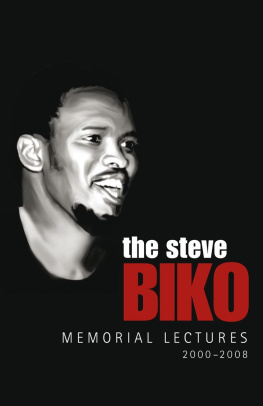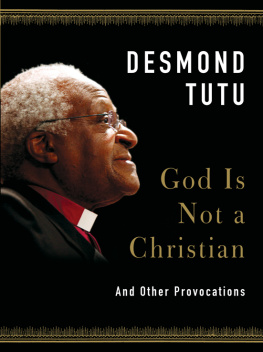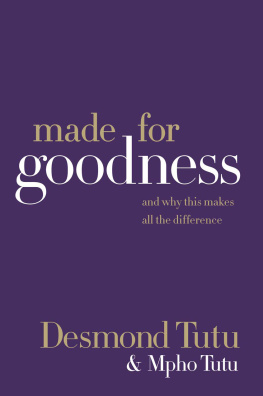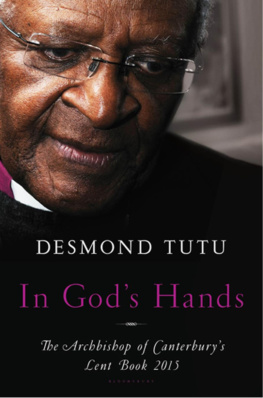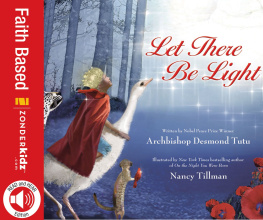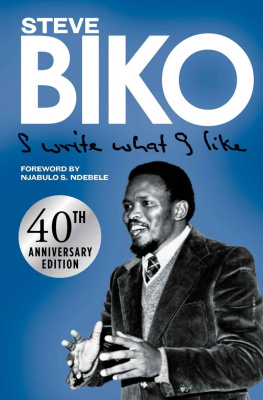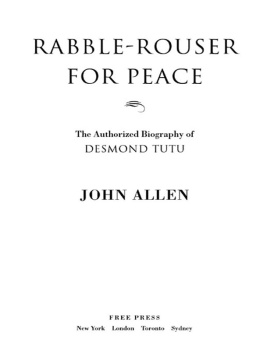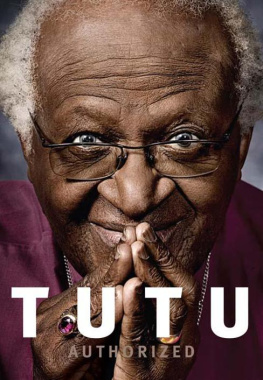Desmond Tutu - The Steve Biko Memorial Lectures 2000–2008
Here you can read online Desmond Tutu - The Steve Biko Memorial Lectures 2000–2008 full text of the book (entire story) in english for free. Download pdf and epub, get meaning, cover and reviews about this ebook. year: 2011, publisher: Macmillan South Africa (Pty) Ltd, genre: Politics. Description of the work, (preface) as well as reviews are available. Best literature library LitArk.com created for fans of good reading and offers a wide selection of genres:
Romance novel
Science fiction
Adventure
Detective
Science
History
Home and family
Prose
Art
Politics
Computer
Non-fiction
Religion
Business
Children
Humor
Choose a favorite category and find really read worthwhile books. Enjoy immersion in the world of imagination, feel the emotions of the characters or learn something new for yourself, make an fascinating discovery.
- Book:The Steve Biko Memorial Lectures 2000–2008
- Author:
- Publisher:Macmillan South Africa (Pty) Ltd
- Genre:
- Year:2011
- Rating:5 / 5
- Favourites:Add to favourites
- Your mark:
- 100
- 1
- 2
- 3
- 4
- 5
The Steve Biko Memorial Lectures 2000–2008: summary, description and annotation
We offer to read an annotation, description, summary or preface (depends on what the author of the book "The Steve Biko Memorial Lectures 2000–2008" wrote himself). If you haven't found the necessary information about the book — write in the comments, we will try to find it.
The Steve Biko Memorial Lectures 2000–2008 — read online for free the complete book (whole text) full work
Below is the text of the book, divided by pages. System saving the place of the last page read, allows you to conveniently read the book "The Steve Biko Memorial Lectures 2000–2008" online for free, without having to search again every time where you left off. Put a bookmark, and you can go to the page where you finished reading at any time.
Font size:
Interval:
Bookmark:
The Steve Biko Memorial Lectures
Memorial Lectures
20002008
The Steve Biko Foundation
and
Macmillan
First co-published 2009 by
The Steve Biko Foundation
PO Box 32005
Braamfontein
Johannesburg, 2017
and
Pan Macmillan South Africa
Private Bag X19
Northlands
Johannesburg, 2116
www.panmacmillan.co.za
ISBN: 978-1-77010-1630
eISBN: 978-1-77010-1845
Editorial matter and selection Steve Biko Foundation Trust 2009
Layout and design Pan Macmillan and Steve Biko Foundation Trust 2009
Text Individual authors 2009
This EPUB edition first co-published 2010 by Pan Macmillan South Africa and The Steve Biko Foundation
The Authors have asserted their rights to be identified as the authors of the lectures.
All rights reserved. No part of this publication may be reproduced, stored in or introduced into a retrieval system, or transmitted, in any form, or by any means (electronic, mechanical, photocopying, recording or otherwise) without the prior written permission of the publishers. Any person who does any unauthorised act in relation to this publication may be liable to criminal prosecution and civil claims for damages.
Proofread by
Di Smith
Cover design by
Printerboyz, East London, South Africa
Iph Indlela? Finding our Way into the Future |
Bikos Children |
Fighting Apartheid with Words |
Recovering our Memory: South Africa in the Black Imagination |
Ten Years of Democracy: 19942004 |
Citizenship as Stewardship |
South Africa: A Scintillating Success Waiting to Happen |
30th Commemoration of Steve Bikos Death |
Energising Democracy: Rights and Responsibilities |
The beginning of the end of apartheid, which commenced with the first democratic elections on 27 April 1994, presented the challenge of disbanding the deeply embedded complexes of race. These complexes of black inferiority and white supremacy, reinforced by an oppressive state machinery, are responsible for framing various aspects of South African life, including public discourse. Historically, black opinion was suppressed and white opinion was granted access to more permissive channels of expression.
Since 1994, an admirable trait of the new South Africa has been an expansion of the culture of public discourse. Never before have so many spoken so audibly, on as many public platforms, about the things that are happening in our society. The AIDS pandemic, the arms deal, the formation of new political parties and the political and economic turmoil in Zimbabwe are a few examples from a growing list of issues that are definitive features of the national dialogue.
The development of this interrogative culture has pushed to the rear of public memory the historic reality that only fifteen years ago such probing voices were silenced. Indeed, like Bantu Stephen Biko, many citizens were persecuted not merely for the views they aired but for those they held, or were said to hold. There existed not only a culture of restraint of the freedom of expression, but also of assaulting the freedom of thought.
It is against this background that the Steve Biko Foundation has positioned itself as a catalyst for national reflection and critical inquiry. The Foundation launched the Steve Biko Memorial Lecture in the year 2000, as the flagship of a broader programme, informed by the values that Biko lived and died for: restoring people to their true humanity.
It has been nine years since that cold, wet September evening, on which Professor Njabulo Ndebele delivered the first Steve Biko Memorial Lecture at the University of Cape Town (UCT). Titled, , Ndebeles lecture, falling on the sixth anniversary of South Africas democracy, was a timely introspection on the state of the transformation process. Crafted and delivered with the precision of a true wordsmith, it set a remarkable tone that has come to be associated with the series.
Continuing with the writers theme the following lecture was delivered by Professor Zakes Mda in 2001. Titled , it was an examination of the new cultural landscape and how the current generation of artists have become occupants and architects of new creative spaces.
In 2002 author Professor Chinua Achebe delivered the third annual lecture, . During this, Achebes first visit to South Africa, he paid tribute to the prophetic gift of the writer, and her or his role in African liberation.
Professor Ngugi wa Thiongos lecture followed in 2003. Ngugi wa Thiongo articulated the importance of language in defining ourselves as African people and actualising the much sought-after African Renaissance.
Former President Nelson Mandela reflected in the 2004 lecture, , on the relevance of Bikos legacy to the emerging African Renaissance and the need for a fundamental change in our consciousness (a change for which Biko had created the blueprint decades before).
The sixth Steve Biko Memorial Lecture was given by Dr Mamphela Ramphele. Titled , the lecture focused on the link between the enjoyment of rights enshrined in South Africas Constitution, the challenge of internalising the values from which they flow and creating a culture in which each individual takes personal responsibility for defending and living those ideals.
On 26 September 2006, Archbishop Emeritus Desmond Mpilo Tutu delivered the seventh Steve Biko Memorial Lecture. The lecture served as a national reminder of the importance of guarding against the degeneration of the social values that have underpinned our struggle for freedom and democracy. According to Tutu, but for the persistence of this challenge of moral decay, South Africa is a scintillating success waiting to happen.
On 12 September 2007, the occasion of the 30th anniversary of Bikos murder in detention, former President Thabo Mbeki summoned us once more to Jameson Hall to deliver the eighth lecture and, to celebrate the life of Stephen Bantu Biko and to invoke a vision that has, over the years, inspired all freedom-loving South Africans decisively to defeat the monster of apartheid and racism and realise the dream of liberation.
Mbekis lecture was a momentous political landmark in that it was a celebration of our political victory through an infrequent yet firm embrace across the lines of political parties.
In 2008, in the midst of a deepening economic crisis in South Africa and the international community, former Finance Minister Trevor Manuel delivered the ninth lecture: . In his address, Manuel challenged the nation, reminding us that the end of apartheid did not mark the achievement of a democratic dispensation but the beginning of creating one.
Described by Professor Ndebele as a resuscitative moment the Steve Biko Memorial Lecture has become an indelible feature on the African calendar it is broadcast live in South Africa and forty-seven African countries on television through a partnership between the Steve Biko Foundation and the South African Broadcasting Corporation (SABC).
Next pageFont size:
Interval:
Bookmark:
Similar books «The Steve Biko Memorial Lectures 2000–2008»
Look at similar books to The Steve Biko Memorial Lectures 2000–2008. We have selected literature similar in name and meaning in the hope of providing readers with more options to find new, interesting, not yet read works.
Discussion, reviews of the book The Steve Biko Memorial Lectures 2000–2008 and just readers' own opinions. Leave your comments, write what you think about the work, its meaning or the main characters. Specify what exactly you liked and what you didn't like, and why you think so.

